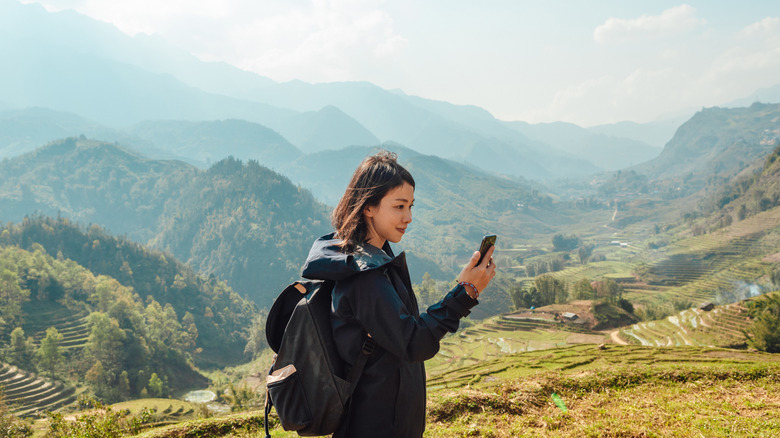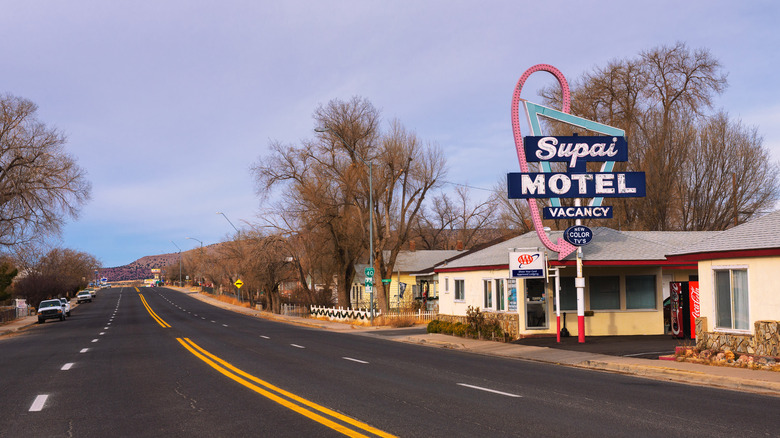The 5 Best Things To Do When Your Phone Suddenly Loses Service On A Road Trip
We may receive a commission on purchases made from links.
Road trips are perfect for cruising down a scenic stretch of highway with your favorite playlist on blast, searching for unique roadside stops across America. That is, until you suddenly lose signal and your GPS freezes. Texts won't send and your carefully curated route vanishes into thin air. It's frustrating, a little unnerving, or even frightening to be suddenly disconnected. But losing service while on the road doesn't have to ruin the ride. In fact, it might just be what was needed to spice up your trip — and there are still many things you can do (and enjoy) while off the grid.
Whether you're heading to America's deepest canyon for a remote wilderness adventure or winding through mountain passes, a signal drop is your cue to shift gears — both mentally and physically. It's your golden chance to slow down and take a break. Here, you can enjoy your surroundings while being truly and fully present, think smarter, and even find a little unexpected fun. Here are the five best things you can do after losing service on a road trip, from staying safe to turning disconnections into an unforgettable adventure.
Stay calm, don't panic, and assess your situation
First things first. Losing phone service while on the road might throw some folks into a panic especially if you don't know the area. But no matter how scary things might seem, it is important to remain calm to accurately assess the situation. By staying calm you'll be able to ensure that your car is drivable, if there are any immediate dangers like a change in the weather, uneven terrain, or maybe some wildlife crossing the road among other things.
Once you have a clear grasp on your situation and surroundings, check if your phone can still send out SMS text messages. These kinds of messages can still go out even when there's no service available, something that can really come in handy in an emergency. Another option is to safely pull over to the side of the road, lock up your car, and walk around for a little bit in search of any free Wi-Fi hotspots. This can help you to find a café or a place to stay the night if needed.
On that same line, hopefully you did plan ahead and booked a stay at a hotel or motel. If you have an already defined route continue driving towards your destination before the night catches up to you while on the road.
Using offline maps as well as external GPS devices
People nowadays are very reliant on navigation apps when traveling. However, if your phone suddenly loses service while in a remote region — like Alaska's Kobuk Valley National Park, one of the state's least crowded and most remote parks, for example — you will lose your online map and, most likely, your way.
This is why it's important to think ahead and prepare a backup before hitting the road. This means downloading offline maps in advance since your phone's own GPS can still help you navigate the previously downloaded map. Some apps like Google Maps allow you to do this thanks to their offline mode, although you won't be able to search for new locations. Alternate apps like Waze, RoadTrippers, or Gaia offer offline route support as well. Of course, you can always go old school and bring an actual physical map with you just like your parents or grandparents did.
Consider investing in a standalone GPS device, like the Garmin Nuvi, as well. These devices work independently without needing to connect to a network (or phone) and are actually incredibly accurate. Lastly, another great tip is to mark landmarks visually as you go. This means paying attention to unique trees or buildings on the way and maybe even photographing them. This can help you find your way back home much easier if by any chance you lose service.
Find shelter to pass the night as well as convenient rest stops
As mentioned before, booking a stay at a hotel or motel before hitting the road might be a life saver. This is especially true as driving at night through remote highways or areas is not recommended due to low visibility. As such, booking your lodgings in advance — as well as marking their exact location — is a must, especially when you suddenly lose mobile coverage.
However, if you don't mind not having all the comforts of a fully equipped hotel room, camping could also be a convenient option. For instance, if you're driving near Utah's Might Five National Parks, you'll find some great areas for free camping. Of course, you might need some help finding your bearings in such areas, hence why a GPS and offline maps come in handy. Marking the location of restaurants, cafés, gas stations, or other interesting locations that can serve as rest stops along your route beforehand, is another handy tip. That way, you'll know where you can stop not only to rest, but also to ask for help and support as needed, as well as stock up on snacks and gas.
Preserve your phone's battery, have an emergency kit ready, and ask for help if needed
You might think that now that your phone has lost service, it's practically useless. But that's actually not the case. As previously mentioned, you might still be able to use some offline maps, send SMS, or maybe just use it to listen to some music. As such, it's very important that you try to preserve as much battery as possible. It might actually be a good idea to invest in a portable charger, just in case you do run out of juice. You can find plenty of great options in the market, both for USB-C chargers as well as older USB-A ports.
Planning ahead is really important when going on a road trip, so don't forget to pack an emergency kit. This can really get you out of a pinch, especially if something other than losing service happens. Your kit doesn't need to be super fancy, just make sure you pack stuff like water, snacks, a first-aid kit, spare fuel just in case, some tools and jumper cables, and maybe a cozy blanket or even a change of clothes. You could also go the extra mile and pack some camping gear.
Lastly, if you really feel like reaching your destination is not possible anymore, use your phone to contact roadside assistance. Even if you don't have service, some providers offer satellite assistance and will lend a hand even if you haven't signed up for their services.
Enjoy the calm and fun that being disconnected can ensue
It's now time to discuss how wonderful it can really be to lose service for a while. For starters, if you lost coverage, then you're probably in an area with lots of nature. This is a great opportunity to get out of the car and stretch your legs for a bit. Once again, check beforehand for interesting landmarks and sights in the area you're exploring. Take this opportunity to sightsee without any distractions. If hiking trails are available, grab your camera (don't forget to pack it!) and get ready to snap some photos of the surrounding landscape.
If you like drawing, try and sketch what you see without any phone notifications breaking your focus. Listening to some music or journaling while surrounded by nature is another good use of the downtime. You could also enjoy a makeshift picnic with your companions while truly engaging in mindful conversations with each other. Finally, you can pack some board-games or even art supplies for some fun activities. Imagination is the only limit here, so make sure to make the best out of the time with no internet and social media at least for a few hours.





